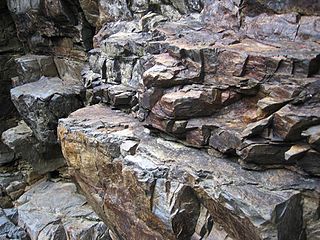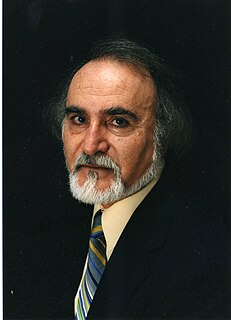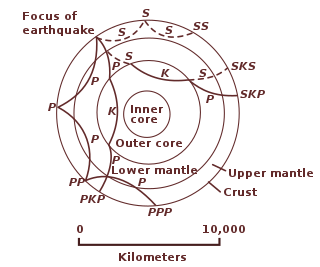This article includes a list of general references, but it lacks sufficient corresponding inline citations .(February 2017) |
The Faculty of Geology is part of the School of Sciences in National and Kapodistrian University of Athens.
This article includes a list of general references, but it lacks sufficient corresponding inline citations .(February 2017) |
The Faculty of Geology is part of the School of Sciences in National and Kapodistrian University of Athens.
The history of the Geological Sciences at Athens University until the year 1982 and the institutional change of the law 1268, is identified with the history of the Chairs and the Professors that taught and is described further below.
Professor K. Mitsopoulos taught the lesson of Mineralogy till 1910, while in the year 1896 the Laboratory and the Museum of Mineralogy and Petrology are founded. In 1910, K. Ktenas is elected as professor for the homonymous Chair and he teaches until his death in 1935. In 1936, G. Georgalas is elected in his place and he stays in this position until 1946. After him, An. Georgiadis (1946–1965) and Gr. Marakis (1973–1994) are also elected as professors.
The Chair of Geology and Palaeontology as well as the homonymous Laboratory and Museum are founded by professor Th. Skoufos after his appointment in the chair mentioned in 1906. He enriched the Laboratory and the Museum with fossils as training material for students and as material for the collection of the museum exhibition, through many excavations realized in various places around Greece.
After Professor Skoufos (1906–1936), Professor M. Mitsopoulos becomes Head of the Laboratory and the Museum and later on G. Marinos (1969–1974) after being called in from the Aristotle University of Thessaloniki. Professor N. Symeonidis takes over in 1975 and stays head of the Laboratory until 1998.
The Chair of Physical Geography and the corresponding laboratory is founded in 1931 and is initially located at the Athens Observatory. Professor I. Trikkalinos is head of the Laboratory until 1958. Later on P. Psarianos is elected as Professor (1959–1974) and then Ath. Papapetrou-Zamani, initially as Associate professor and then as Professor (1975–1997).
In the year 1931 the Chair of Seismology and the corresponding laboratory is founded with Professor N. Kritikos (1930–1947) as head of the Laboratory, which is initially located at the Athens Observatory. Later on A. Galanopoulos (1949–1978) and I. Drakopoulos (1979–1999) were elected.
The Chair of Ore Geology and the corresponding Laboratory are founded in 1961 and the elected Professor G. Paraskevopoulos taught until his death in 1983.
According to the law 1268/82 the School of Sciences is founded, which also includes the Faculty of Geology. The previously mentioned Chairs were annulled and the following Departments were created and still exist to this day:
Within the framework of the postgraduate studies program of the Faculty of Geology the following two year courses are offered:
as well as the inter-faculty Postgraduate Study Program in Oceanography in which the following faculties are involved: Geology, Biology, Physics, Chemistry.
The Faculty of Geology manages two museums

A volcanologist, or volcano scientist, is a geologist who focuses on understanding the formation and eruptive activity of volcanoes. Volcanologists frequently visit volcanoes, sometimes active ones, to observe and monitor volcanic eruptions, collect eruptive products including tephra, rock and lava samples. One major focus of inquiry in recent times is the prediction of eruptions to alleviate the impact on surrounding populations and monitor natural hazards associated with volcanic activity. Geologists who research volcanic materials that make up the solid Earth are referred to as igneous petrologists.

Don Lynn Anderson was an American geophysicist who made significant contributions to the understanding of the origin, evolution, structure, and composition of Earth and other planets. An expert in numerous scientific disciplines, Anderson's work combined seismology, solid state physics, geochemistry and petrology to explain how the Earth works. Anderson was best known for his contributions to the understanding of the Earth's deep interior, and more recently, for the plate theory hypothesis that hotspots are the product of plate tectonics rather than narrow plumes emanating from the deep Earth. Anderson was Professor (Emeritus) of Geophysics in the Division of Geological and Planetary Sciences at the California Institute of Technology (Caltech). He received numerous awards from geophysical, geological and astronomical societies. In 1998 he was awarded the Crafoord Prize by the Royal Swedish Academy of Sciences along with Adam Dziewonski. Later that year, Anderson received the National Medal of Science. He held honorary doctorates from Rensselaer Polytechnic Institute and the University of Paris (Sorbonne), and served on numerous university advisory committees, including those at Harvard, Princeton, Yale, University of Chicago, Stanford, University of Paris, Purdue University, and Rice University. Anderson's wide-ranging research resulted in hundreds of published papers in the fields of planetary science, seismology, mineral physics, petrology, geochemistry, tectonics and the philosophy of science.
W. Gary Ernst is an American geologist specializing in petrology and geochemistry. He currently is the Benjamin M. Page Professor Emeritus in Stanford University's Department of Geological Sciences.
Earth science is an all-embracing term for the sciences related to the planet Earth. It is arguably a special case in planetary science, the Earth being the only known life-bearing planet. There are both reductionist and holistic approaches to Earth science. There are four major disciplines in earth sciences, namely geography, geology, geophysics and geodesy. These major disciplines use physics, chemistry, biology, chronology and mathematics to build a quantitative understanding of the principal areas or spheres of the Earth system.

Ding Zhongli is a Chinese geologist and politician. He is a Vice Chairman of the Standing Committee of the National People's Congress and chairman of the China Democratic League.

Earth science or geoscience includes all fields of natural science related to the planet Earth. This is a branch of science dealing with the physical, chemical, and biological complex constitutions and synergistic linkages of Earth's four spheres, namely biosphere, hydrosphere, atmosphere, and geosphere. Earth science can be considered to be a branch of planetary science, but with a much older history. Earth science encompasses four main branches of study, the lithosphere, the hydrosphere, the atmosphere, and the biosphere, each of which is further broken down into more specialized fields.

A geologist is a scientist who studies the solid, liquid, and gaseous matter that constitutes Earth and other terrestrial planets, as well as the processes that shape them. Geologists usually study geology, although backgrounds in physics, chemistry, biology, and other sciences are also useful. Field research is an important component of geology, although many subdisciplines incorporate laboratory and digitalized work.

Manuel Berberian is an Iranian-Armenian earth scientist. He was born on the 27th of October, 1945 into an immigrant Armenian family in Tehran. He specializes in earthquake seismology, active faulting and folding, active tectonics, continental tectonics, historical seismicity, archaeoseismicity, earthquake hazard minimization, geological mapping, and environmental science and engineering.

The École et Observatoire des Sciences de la Terre is an institution under the supervisory authority of the University of Strasbourg and the CNRS in charge of education, research, observation in Earth Science and its diffusion. Situated in two buildings located on the central campus of the University of Strasbourg, EOST consist of more than 150 permanent employees among its staff.

The following outline is provided as an overview of and topical guide to geophysics:
Bernard (Bernie) Wood is a British geologist, and Professor of Mineralogy and Senior Research Fellow at the University of Oxford. He specializes in the thermodynamics of geological systems, using experimental techniques. He is a prominent figure in the field of experimental petrology, having received multiple awards throughout his career and taught at several universities worldwide.
Germaine Anne Joplin was an Australian geologist and winner of the Clarke Medal in 1963.

Faculty of Science is a faculty of the University of Zagreb that comprises seven departments - biology, physics, chemistry, mathematics, geophysics, geography and geology. The Faculty has 288 full professors, associate and assistant professors, 180 junior researchers and about 6000 students.
Mihir Kumar Bose (1933–2009) was an Indian geologist and a professor at the Presidency College, Kolkata. He was known for his studies on igneous petrology and was an elected fellow of the Geological Survey of India, Indian National Science Academy, and the Indian Academy of Sciences. The Council of Scientific and Industrial Research, the apex agency of the Government of India for scientific research, awarded him the Shanti Swarup Bhatnagar Prize for Science and Technology, one of the highest Indian science awards for his contributions to Earth, Atmosphere, Ocean and Planetary Sciences in 1976.
Dominique Weis is a Canadian scientist. She is a Canada Research Chair in the Geochemistry of the Earth's Mantleat at the University of British Columbia.
Craig E. Manning is a professor of geology and geochemistry in the Department of Earth, Planetary, and Space Sciences at the University of California, Los Angeles, where he served as department chair between 2009 and 2012. Manning's research interests include water chemistry, thermodynamics, gas chemistry, geochemistry, igneous petrology, and metamorphic petrology.

The Department of Earth Sciences is the Earth Sciences department of the University of Oxford, England, which is part of the university's Mathematical, Physical and Life Sciences Division. The department is based in the Earth Sciences building on South Parks Road in the Science Area.

The Department of Earth and Environmental Sciences at The University of Manchester is one of the oldest earth and environmental science departments in the UK. The Department takes roughly 100 new undergraduates and 140 postgraduates each year, and employs 90 members of academic staff, 41 postdoctoral researchers, 27 technical staff and 20 administrative staff.

Iraklis Mitsopoulos was an author, biologist, archaeologist, physicist, zoologist, paleontologist, mineralogist, geologist, and professor. He is considered the father of modern natural sciences in Greece. He taught classes for over forty-seven years of his life. His nephew world renowned Greek geologist Konstantinos M. Mitsopoulos became the first student to receive a doctorate degree in the natural sciences at the University of Athens. His son Maximos Mitsopoulos also became a geologist. Hercules co-founded the Museum of Physical Geography in Athens, Greece, and directed its Zoological Department. He was the founder and lifelong President of the Zoological Department at the Museum of Paleontology, Geology,, Zoology and Botany. The museum is part of the University of Athens. He built the framework of modern Greek natural scientific education.